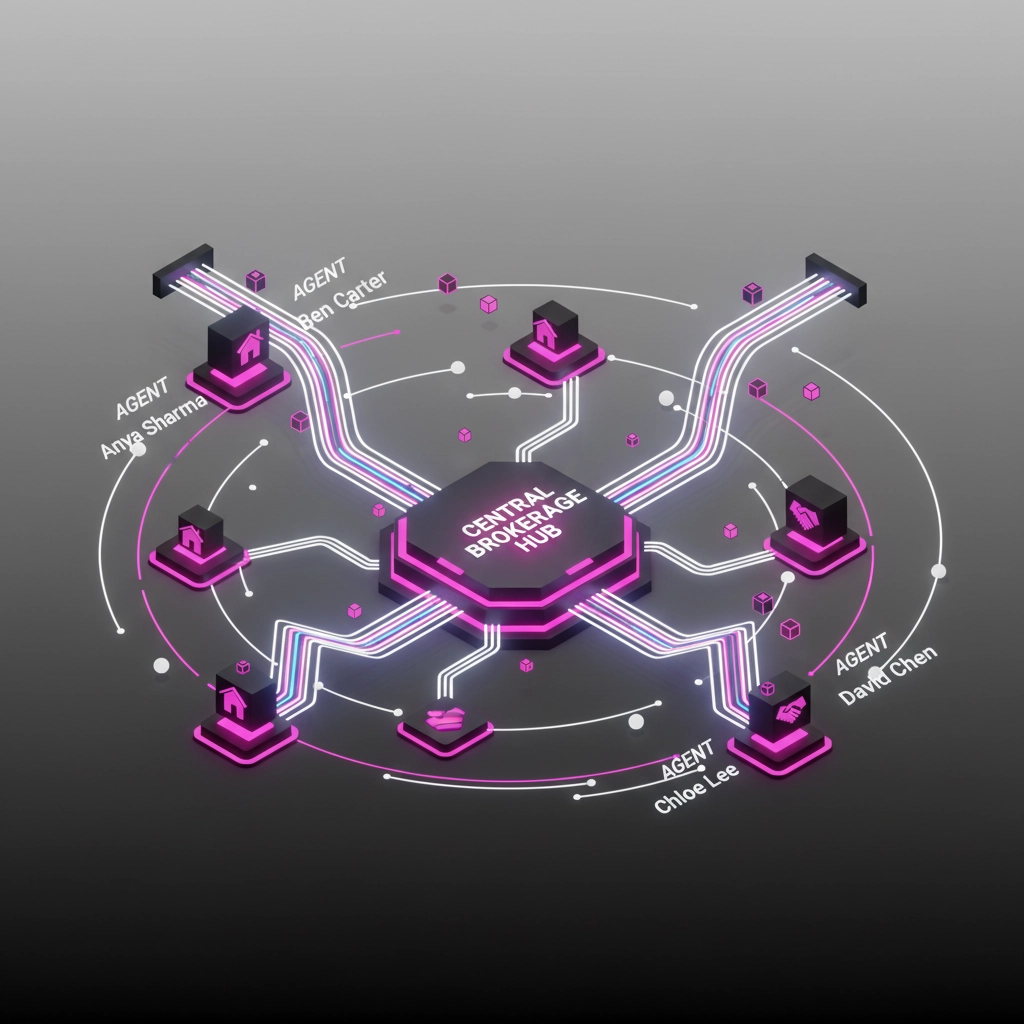Real estate agents juggle dozens of tasks daily. Showings, follow-ups, client meetings, and administrative work pile up fast. Manual task assignment creates bottlenecks, missed opportunities, and stressed teams.
AI-powered task assignment changes this dynamic completely. Instead of agents manually coordinating schedules and dividing responsibilities, intelligent systems automatically distribute work based on availability, expertise, and priority levels.
What AI Task Assignment Delivers
AI task assignment systems analyze incoming requests, evaluate team capacity, and instantly assign tasks to the most suitable agent. The system considers multiple factors simultaneously – current workload, geographic location, client preferences, and individual agent strengths.
When a new lead submits a showing request, the AI immediately identifies which agent has availability, knows the property area, and matches the client’s timeline. The assignment happens in seconds, not hours.

Core Capabilities That Drive Results
Smart Calendar Integration
AI systems sync with multiple calendar platforms and instantly identify availability conflicts. When a client wants to reschedule a showing, the system automatically notifies all parties and suggests alternative times that work for everyone involved.
Advanced systems account for travel time between appointments, ensuring agents have realistic schedules without back-to-back conflicts across town.
Intelligent Lead Routing
Not all leads convert at the same rate. AI analyzes lead quality indicators – budget, timeline, communication patterns – and routes high-value prospects to available agents first. This prioritization ensures your best opportunities get immediate attention.
The system learns from conversion patterns and becomes more accurate over time at identifying which leads deserve top priority.
Automated Follow-Up Generation
Every client interaction triggers appropriate follow-up tasks. After a showing, the system automatically assigns follow-up calls, email sequences, and document preparation to the responsible agent. No manual task creation required.

How Implementation Works
Phase 1: Data Integration
Connect your existing CRM, calendar systems, and communication platforms. The AI needs access to current schedules, client information, and team availability to make intelligent assignments.
Most systems integrate within hours, not weeks. Your team continues working normally while the AI learns your patterns and preferences.
Phase 2: Rule Configuration
Set parameters for task assignment. Define which agents handle specific property types, geographic areas, or client segments. Establish priority levels for different task types.
The system respects these rules while optimizing for efficiency and workload balance.
Phase 3: Progressive Automation
Start with simple task assignments – showing appointments and follow-up calls. As the system proves reliable, expand to more complex workflows like transaction coordination and document management.
Real-World Benefits
Immediate Response Times
Leads receive instant responses, even outside business hours. The AI assigns follow-up tasks immediately and sends confirmation messages to prospects. This rapid response builds trust and captures opportunities competitors miss.
Studies show leads contacted within the first five minutes are 100 times more likely to connect than those contacted after 30 minutes.
Balanced Workloads
AI prevents task overload by distributing assignments evenly across available team members. No single agent gets overwhelmed while others remain underutilized.
The system tracks completion rates and adjusts future assignments to maintain optimal productivity levels across the entire team.

Reduced Administrative Overhead
Eliminate time-consuming coordination calls and email chains. The AI handles scheduling conflicts, reschedules appointments, and ensures everyone stays informed automatically.
Agents spend less time on administrative tasks and more time building client relationships and closing deals.
Improved Accountability
Every task assignment includes clear deadlines and responsibility tracking. Managers gain visibility into team productivity without micromanaging individual agents.
Automated reporting shows completion rates, response times, and bottlenecks that need attention.
Strategic Implementation Tips
Start With High-Volume Tasks
Begin automation with tasks that happen frequently – showing appointments, initial contact calls, and routine follow-ups. These provide immediate productivity gains while building team confidence in the system.
Avoid starting with complex transaction coordination until the team adapts to basic automation workflows.
Maintain Human Oversight
AI handles routine assignments efficiently, but complex client situations still require human judgment. Establish clear escalation paths for unusual circumstances or high-value opportunities.
Train your team to review AI recommendations and make adjustments when necessary.
Track Performance Metrics
Monitor key indicators like response times, conversion rates, and task completion percentages. Compare pre-automation and post-automation performance to measure ROI.
Use this data to refine assignment rules and improve system accuracy over time.

Integration With Business Intelligence
Modern real estate teams combine task assignment automation with comprehensive business intelligence platforms. This integration provides deeper insights into productivity patterns and market opportunities.
PWRU’s Pulse Intelligence platform seamlessly connects with automated task assignment systems, giving agents and brokers complete visibility into their operations. The system tracks not just what tasks get assigned, but how those assignments impact overall business performance.
Agents can see which automated assignments lead to closings, identify the most productive time slots, and understand which task types generate the highest ROI. This intelligence helps refine automation rules for even better results.
Getting Started
Evaluate Current Workflows
Document your team’s existing task assignment process. Identify bottlenecks, frequent delays, and repetitive coordination activities that automation could eliminate.
Calculate the time your team currently spends on manual scheduling and task distribution. This baseline helps measure automation benefits.
Choose the Right Platform
Select an AI system that integrates with your existing technology stack. Avoid platforms that require completely new workflows or extensive training periods.
Look for systems with proven real estate industry experience and strong customer support during implementation.
Plan Team Training
Introduce automation gradually with proper training at each phase. Show your team how AI task assignment reduces their administrative burden rather than replacing their expertise.
Focus on how automation frees them to spend more time on high-value client activities that directly impact their income.

The real estate industry is moving toward intelligent automation. Teams that implement AI task assignment now gain competitive advantages in response times, client satisfaction, and operational efficiency.
Start with basic task assignment automation and expand capabilities as your team adapts. The technology exists to eliminate most manual coordination work, letting your agents focus on what they do best – building relationships and closing deals.
Ready to transform your team’s productivity? Explore how PWRU’s comprehensive platform can streamline your task assignment process at plan.pwru.app.





